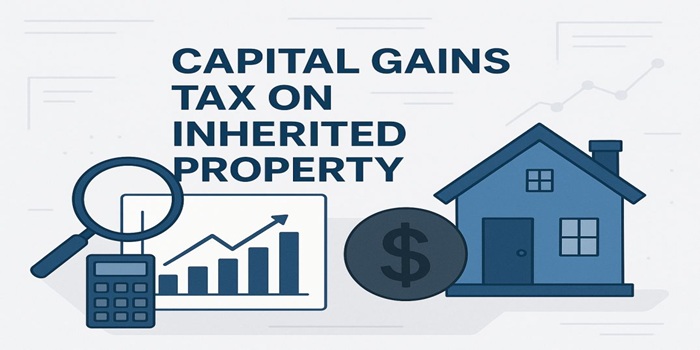
Inheriting property can be both a blessing and a financial challenge in Canada. While receiving an inheritance can provide significant value, understanding the tax implications, especially concerning capital gains tax on inherited property, is essential to make informed decisions. Many Canadians ask: Do you pay capital gains tax on an inheritance? And more importantly, how to avoid capital gains tax in Canada when selling inherited property. At SRJ Chartered Professional Accountants, we help clients navigate these complex tax rules to minimize liabilities and preserve wealth.
This article will provide a comprehensive overview of capital gains on inherited property in Canada, explain who pays the tax, explore strategies to reduce or avoid it, and answer frequently asked questions to ensure you have a clear understanding of your obligations and options.
Understanding Capital Gains Tax on Inherited Property in Canada
First, it’s important to clarify that inheritance capital gains tax is not the same as an inheritance tax. Canada does not have an inheritance tax per se, but capital gains tax applies under certain circumstances when you inherit property.
When a person passes away, the Canada Revenue Agency (CRA) deems that their assets, including real estate, are sold at fair market value immediately before death. This deemed disposition triggers a capital gains event, potentially resulting in tax owed on the appreciation of the asset during the deceased’s lifetime.
The critical takeaway is that capital gains are calculated based on the difference between the original purchase price (adjusted cost base) and the fair market value at the date of death. The estate is responsible for paying any capital gains taxes arising from this deemed disposition before assets are distributed to heirs.
However, for the beneficiary inheriting the property, there is generally no immediate capital gains tax owed upon inheritance itself, because the property’s cost base is “stepped up” to the fair market value at the date of death. This means the beneficiary’s potential capital gains tax liability only arises if and when they sell the property in the future, based on the difference between the fair market value at inheritance and the eventual sale price.
Who Pays Capital Gains on Inherited Property in Canada?
Understanding who pays capital gains on inherited property in Canada is crucial. When someone dies, their estate must settle all outstanding tax obligations, including any capital gains tax triggered by the deemed disposition of property at death. This means the estate itself pays capital gains tax on the increase in value of the property from purchase to the date of death.
Once the property passes to the beneficiary, the beneficiary’s adjusted cost base becomes the fair market value of the property at the date of death. The beneficiary will be liable for capital gains tax only if they decide to sell the property later, and the gains will be calculated from that stepped-up value.
How to Avoid Capital Gains Tax on Sale of Inherited Property

Many beneficiaries naturally want to know how to avoid capital gains tax in Canada when selling inherited property. While it may not be possible to completely avoid capital gains tax, there are several strategies and exemptions that can help minimize or defer the tax burden.
1. Principal Residence Exemption
If the inherited property was the deceased’s principal residence for all the years they owned it, the estate can claim the principal residence exemption to eliminate or greatly reduce capital gains tax. This exemption is available on one property per family unit per year, which can provide significant tax relief.
2. Transfer Property to a Spouse or Common-Law Partner
Property can be transferred to a surviving spouse or common-law partner on a tax-deferred basis under what is known as a “rollover.” This means the property’s adjusted cost base carries over to the spouse, deferring capital gains tax until the spouse sells the property or passes away. This is a powerful tool to defer inheritance capital gains tax and preserve wealth within the family.
3. Use a Trust
Establishing a trust can sometimes help reduce capital gains tax on inherited property by controlling the timing of asset distribution and tax events. Trusts can provide flexibility in managing the property and may allow income-splitting or deferral strategies, though they are complex and should be designed with the help of professional advisors like SRJ Chartered Professional Accountants.
4. Hold the Property Long-Term
Since capital gains tax is only payable upon sale, holding on to the inherited property longer can be a strategy to defer taxes. This also allows the property to potentially appreciate further, and the beneficiary can explore options such as renting it out for income while deferring capital gains tax.
5. Consider Renovations and Adjusted Cost Base
Investments in the property, like renovations, can increase the adjusted cost base and reduce taxable capital gains when the property is sold. Proper documentation of capital improvements is crucial to maximize this benefit.
Are Capital Gains Taxes Due Immediately Upon Inheritance?
The straightforward answer is no, capital gains taxes are generally not due immediately upon inheritance. Instead, the deceased’s estate is responsible for paying any capital gains tax related to the deemed disposition at death. The beneficiary inherits the property at its fair market value, and capital gains tax for the beneficiary only applies if they sell the property in the future at a profit over that value.
FAQ Section – Capital Gains Tax on Inherited Property
Who pays capital gains on inherited property in Canada?
The estate of the deceased pays capital gains tax on any increase in property value from the original purchase price to the fair market value at death. Beneficiaries pay capital gains tax only if they sell the inherited property for more than its value at inheritance.
How to avoid capital gains tax on the sale of inherited property?
To minimize or avoid capital gains tax, beneficiaries can use strategies such as claiming the principal residence exemption, transferring property to a spouse via rollover provisions, holding the property long-term, and documenting capital improvements. Consulting with accountants like SRJ Chartered Professional Accountants is advisable to tailor a plan.
Can a property be transferred to a spouse without capital gains?
Yes. Canadian tax law allows the transfer of property to a surviving spouse or common-law partner on a tax-deferred basis, meaning no immediate capital gains tax is triggered. This rollover provision defers the tax until the spouse sells the property or passes away.
Are capital gains taxes due immediately upon inheritance?
No, capital gains taxes are generally not due immediately upon inheritance. They are paid by the deceased’s estate on the deemed disposition at death, and any tax for the beneficiary only arises when the property is sold.
Can a trust help reduce capital gains on inherited property?
Trusts can be effective estate planning tools to manage capital gains taxes by controlling timing and distribution of assets, potentially allowing income-splitting or tax deferral. However, trusts are complex and should be set up with professional advice.
Is inheritance considered income in Canada?
No, inheritance itself is not considered taxable income in Canada. However, any income generated from the inherited assets, such as rental income or capital gains from selling property, is taxable.
Why Work with SRJ Chartered Professional Accountants?
Navigating the nuances of capital gains tax on inherited property in Canada requires expertise. At SRJ Chartered Professional Accountants, we provide comprehensive tax planning and estate advice to help you understand how to avoid capital gains tax in Canada effectively. Our experienced professionals work closely with you to optimize tax strategies, ensure compliance with CRA regulations, and preserve your family’s wealth for future generations.
Whether you are managing a complex estate or simply need guidance on selling an inherited property, SRJ Chartered Professional Accountants offers personalized solutions designed to meet your unique circumstances.
Conclusion
Inheriting property in Canada brings with it important tax considerations, particularly surrounding capital gains tax. While Canada does not impose inheritance tax, capital gains tax can be triggered by the deemed disposition of assets at death, and future sales by beneficiaries can also create tax liabilities. Understanding capital gains on inherited property, the role of the estate versus beneficiaries, and legal provisions like the principal residence exemption and spousal rollover is vital.
By implementing strategies to defer or reduce capital gains tax and working with expert accountants like SRJ Chartered Professional Accountants, you can manage the tax implications and protect your inheritance. If you have questions about inheritance capital gains tax or want to develop a personalized estate plan, contact SRJ Chartered Professional Accountants for professional advice tailored to your needs.